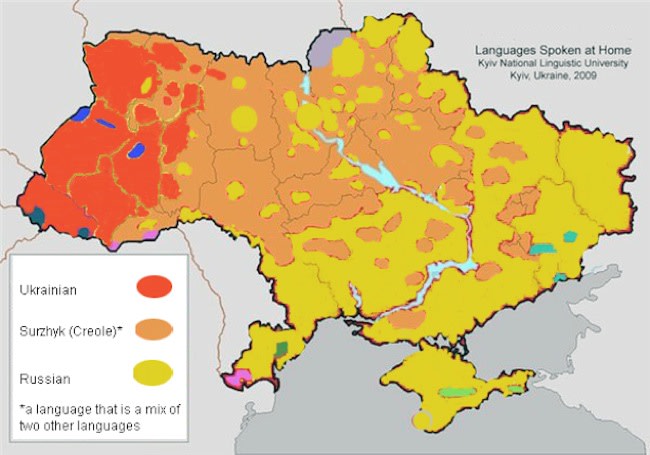
The Ukrainian language beats popularity records. In 2016, on the wave of patriotic sentiments, 69% of the country’s residents named it native language, and this is even higher than in 1991. Moreover, 55% of respondents told representatives of the Razumkov Center (Ukrainian Centre for Economic and Political Studies named after Alexander Razumkov) that they use the Ukrainian language in everyday and family communication. Never before in the history of independent Ukraine had it reached even 50%, and now it has risen immediately to 55%. However, it would be a mistake to judge the situation with the Ukrainian language only on these data.
Where do the numbers come from? Why do statistics hit the records?
In many traditionally Russian-speaking regions, researchers simply could not collect data for the national statistics. Therefore, the polls were not conducted in some parts of Donetsk and Lugansk regions, which were controlled by the “DNR” and “LNR”, as well as in the territory of the occupied Crimea. In order to understand the real situation with the Ukrainian language, one has to dig deeper: assess the statistics for individual regions, track use of language in education, book publishing, periodicals and other spheres.
For example, if the number of citizens speaking Ukrainian at home has increased dramatically, in public areas things are somewhat different. In 2012, 42% of Ukrainians communicated in the state language at work and in educational institutions (according to the data of the project “Movi Spilkuvannya Ukraintsiv” (Languages Ukrainians communicate), by Research & Branding Group). In 2016, such polls were not conducted, but participants of the survey by Razumkov Center were asked to comment on whether they believe that Ukrainians should communicate in the official language in official institutions. 41.7% agreed with this statement. That is, when it comes to official use of the Ukrainian language, the views have not changed.
At the same time, Media Sapiens cites data according to which, as of the 2014/15 academic year, 90.8% of Ukrainian schools are taught exclusively in Ukrainian, which is 9% more than a year ago. The authors argue that a more detailed study of the issue shows a completely different situation. The number of those who study in Ukrainian really increased, but only for a few tenths of a percent. A sharp jump is due only to the fact that schools that are located in the occupied territories have not been included in the summary table.
Ukrainians would like to know their native language better
The gap between how many Ukrainians consider Ukrainian language native, and how many people use it in real life, is quite significant. Partly this is due to the fact that in Russian people can get more information. 21.6% of respondents would like to improve their level of knowledge of the Ukrainian language. It is interesting that the highest numbers on this issue are in those areas of Donetsk and Lugansk region, where it was possible to conduct the survey; that is 33.4%. In other eastern regions, only 7.8% of the inhabitants would like to know Ukrainian better.
For those who reported their desire to know Ukrainian better, the researchers suggested choosing training options that they might like. The respondents were most interested in the idea of Ukrainian language courses in their spare time, fewer participants were interested in courses at work or at their place of study; the next comes distance courses, and last but not least are training programs for self-study. It is worth noting that the gap between the numbers is insignificant. Participants could not know all the answers that they would be interested in trying, and given that these options scored almost the same number of points, we can assume that the majority of respondents noted all possible scenarios at once.
Judging by our experience, the number of people who want to learn the Ukrainian language is really growing. People are willing to spend their free time and pay for Ukrainian lessons. Of course, a significant part of our students is school children, who need to prepare for UPE, which shows not the best quality of Ukrainian language teaching in schools. However, there are also adult students. Some point to career aspirations, while others plan to improve the level of their native language for personal satisfaction. According to my observations, the general trend is very positive. However, adult Ukrainians are rarely willing to pay teachers a significant amount of studying such an accessible subject as the Ukrainian language. Yet, many cannot study effectively on their own – there is no motivation. I think it would be good if working groups or friendly companies organized classes in the group – this is both savings and motivation.
Ukrainian vs Russian: what language Ukrainians choose
When it comes to language, the traditional division of the Eastern and Western Ukraine remains in effect. Lutsk, Rivne, Ternopil, Lviv and Ivano-Frankivsk are expectedly five most Ukrainian-speaking cities. In these settlements, the number of people speaking Ukrainian at home exceeds 90%. Russian language is most often used in Kharkov: 84% of Kharkov residents communicate in Russian at home. However, this is the highest rate. Odessa and Nikolaev are next in the top five Russian-speaking cities – less than 80% of survey participants chose exclusively Russian as the language of home communication. Zaporozhye and Kherson with about 65% of the Russian-speaking population come next.
The figures that determine the position of the Ukrainian language in culture and the media are also of great interest. For example, according to public organization “Prostir Svobody”, in 2015, 47.6% of films in legal rentals were dubbed in Ukrainian. For comparison, in 2014 the figure was 42.4%, in 2013 – 43.5%. In 2015, the percentage of films voiced in Ukrainian was 36.2% (23.1% and 25.8% respectively two years earlier). The data for 2015 is for the first half of the year. The researchers explain the changes in favor of Ukrainian language by a decrease in number of films of Russian production in the Ukrainian film distribution.
The tendency to decline is also observed in the media. For example, in 2010, Ukrainian-language printed press accounted for 19.6% of all periodicals in the country; for comparison, in 2014 they were only 9.9%. On the highest rated TV channels, programs in Ukrainian are about 30% of airtime in prime time. Although in 2015 the amount of Ukrainian-language music on popular radio stations in the interval from 4pm to 8pm through increased to 4.9%, it is still eight times less than Russian-language music content, which is 40.2% respectively. Reminder: at that time, quotas for the use of Ukrainian-language music already existed, but the radio station could fulfill the requirements only by broadcasting the “mandatory” pieces at night.
As we can see, the positions of the Ukrainian language in culture and media are somewhat improved, but the pace of improvement does not look particularly convincing.
Summarizing, it is worth noting that the Ukrainian language still stands firmly in its positions and even makes progress in winning popularity. However, we still have a lot to work on.
Do Ukrainians speak English?
Of course, if you stay at a hotel, and not in the apartment, you will have someone at the reception to talk to in English. Also in all elite restaurants and cafes in the city center, waiters speak English. In case of cheap cafes, one shall not expect super service and English-speaking personnel. As for ordinary citizens and if you need to ask on the street how to get to Khreshchatyk, then the chances are 50/50 – depending on your luck. Even if a person does not have perfect English, he will show you the way with the help of sign language, since Ukrainians are very friendly and hospitable people. If you go to a bar and want to get acquainted with a girl –you will soon find a company, but most likely her English will be intermediate. Whatever it is, you can always find an English-speaking friend on our website here and order a hang out with a local or a sightseeing tour or a bar crawl. This is an excellent option that will bring you closer to understanding Kiev and Ukraine in general, our culture, mentality and history.
Guide me UA



